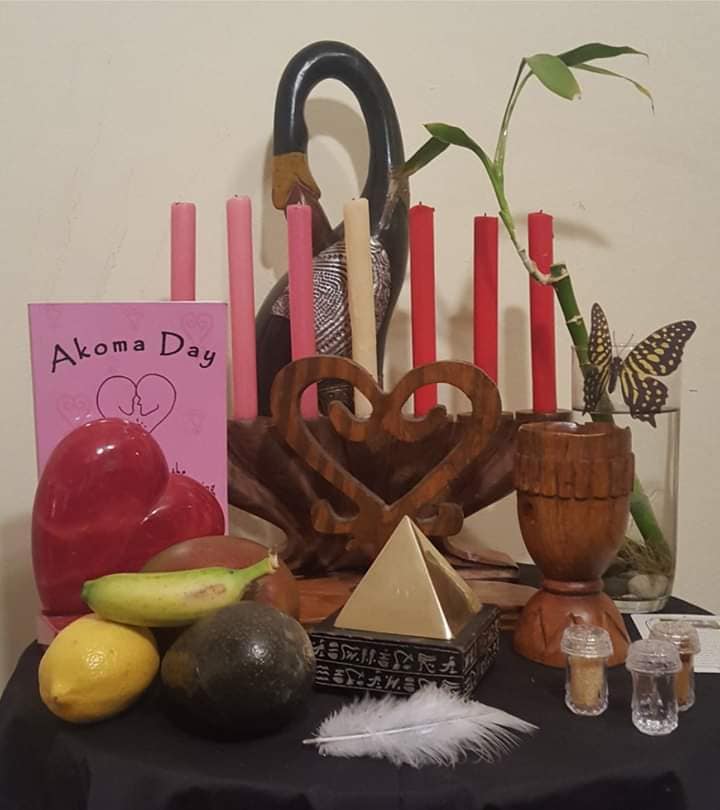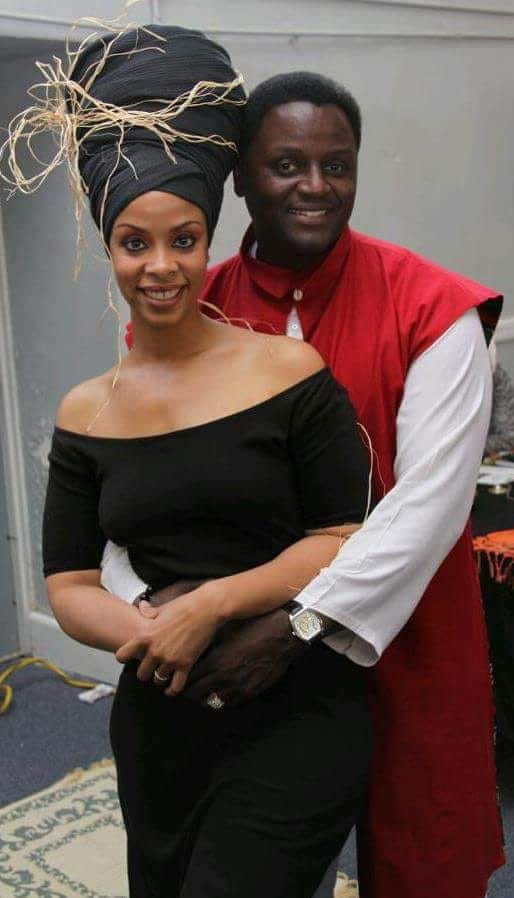Akoma Day

What is Akoma Day
Akoma Day is a 7-day Black Love holiday celebrated from February 14th to February 20th and offered as an alternative to Valentine’s Day for black people who want to celebrate their love with cultural integrity. Considering black people were the first to develop love words, terms, songs, poems, talismans and monuments of love, we should also return to our autochthonous holiday expressions. The focus of Akoma Day is to restore Black Love as the primordial example of love personified for all humanity to model. The holiday was first conceived in 1997, celebrated locally in 1999 and then formally introduced internationally in 2001.
Although officially celebrated for one week, the holiday is to be embodied throughout the year as a tool to attain the pinnacle level of Love in our intimate, personal and professional relationships. Part of celebrating the holiday involves organizing a sacred space to invite the 7 virtues, 7 principles and 7 symbols into your life and love.
The 7 Virtues of Akoma Day
- Flexibility
- Patience
- Faithfulness
- Consistency
- Endurance
- Fondness/Goodwill
- Forgiveness
The 7 Principles of Akoma Day
- Unified Purpose
- Unified Labor
- Unified Transformation
- Unified Fruit
- Unified Body
- Unified Mind
- Unified Spirit
We’ve chosen to unify Adinkra, Kiswahili and Mdu Ntr words and symbols to submerge you into a diversity of thought concepts that reflect a singular unity without singular uniformity within diasporic African consciousness.
The 7 symbols of Akoma Day include:
Meza wa Akoma (alter) – The Akoma alter is a table or flat surface that represents the unbreakable foundation of Black Love. It is also the literal resting place for all the other symbols and represents Unified Purpose.
Mfuno wa Akoma (cloth) – The Akoma cloth is a black fabric used to cover the alter and also represents Unified Purpose. This covering symbolizes that universal black culture is the origin of love as service throughout human history and the best protective shield in a today’s hostile environment. Finally, this black cloth represents the sacred veil of ancient initiation.
“Akoma” – The Akoma is an Akan word from Ghana West Africa and represents the spiritual heart. It is the composite of all the holiday’s virtues: Flexibility, Patience, Faithfulness, Consistency, Fondness, Goodwill, Endurance and Forgiveness. It is also the primary symbol of the sacred science of soul mating and Unified Labor. OR “Sankofa” – This Adinkra symbol is a salient reminder that it is necessary to reach back to the past in order to properly understand the present and build the future. It also represents the first principle of Unified Labor.
“Kipepeo wa Akoma” (butterfly) – This symbol highlights the grace, beauty, and fluidity of the third principle Unified Transformation because love transforms us all.
“Mazao wa Akoma” (fruit) – Symbolizes the fourth principle Unified Fruit the bountiful harvest of a focused Black Love in thought, speech and action.
“Ubele wa Akoma” (feather) – This symbol signifies the moral/ethical foundation of the Goddess MAAT which embodies the fifth principle of Unified Mind.
“Mishumma wa Akoma” (candles)
3 Red for cultural passion (left side)
3 Pink for love service (right side)
1 White for spiritual purity (center)
The candles are to be lit daily one at a time, alternating from the farthest outer red and the farthest outer pink, second middle red then second middle pink, third inner red then third inner pink until finally the center white candle is lit on the 7th day. The lighting of the candles represent the sixth principle of Unified Body.
“Kombe wa Akoma” (libation cup) – The ceremonial cup is used to give adorations and praises to the celestial ancestors and connect them through libation to our present day examples of Black Love excellence. This serves as the seventh principle of Unified Spirit.
The alter can also be adorned with personal keepsakes and symbols that represent love concepts in your relationship or family. We often include a pledge to declare our the commitment to love in thought, speech and action all year long and pictures, jewelry, and/or precious personal items that represent love.
We use a bamboo plant to symbolizes the strength gained through practicing emotional flexibility. We also use the Tasting of Four Elements on our love alter. Adapted from the Yoruba tradition, bitter, sour, hot and sweet food is place on the alter to represent “for better or worse, for richer or poorer, in sickness and in health”. Many couples use this ritual in wedding ceremonies with vinegar, lemon, cayenne pepper and honey to represent the bitter, sour, hot and sweet parts of life and marriage.
The Akoma alter and the related symbols should be displayed in the home, office or temple for a period of 7 days to represent the oneness of Black Love exemplified by the seven virtues and principles of the Akoma holiday.
The Akoma Day Altar is the central Love station for the daily celebration of the Akoma Day Holiday
What is Akoma Day
Akoma Day is a 7-day Black Love holiday celebrated from February 14th to February 20th and offered as an alternative to Valentine’s Day for black people who want to celebrate their love with cultural integrity. Considering black people were the first to develop love words, terms, songs, poems, talismans and monuments of love, we should also return to our autochthonous holiday expressions. The focus of Akoma Day is to restore Black Love as the primordial example of love personified for all humanity to model. The holiday was first conceived in 1997, celebrated locally in 1999 and then formally introduced internationally in 2001.
Although officially celebrated for one week, the holiday is to be embodied throughout the year as a tool to attain the pinnacle level of Love in our intimate, personal and professional relationships. Part of celebrating the holiday involves organizing a sacred space to invite the 7 virtues, 7 principles and 7 symbols into your life and love.
The 7 Virtues of Akoma Day
- Flexibility
- Patience
- Faithfulness
- Consistency
- Endurance
- Fondness/Goodwill
- Forgiveness
The 7 Principles of Akoma Day
- Unified Purpose
- Unified Labor
- Unified Transformation
- Unified Fruit
- Unified Body
- Unified Mind
- Unified Spirit
We’ve chosen to unify Adinkra, Kiswahili and Mdu Ntr words and symbols to submerge you into a diversity of thought concepts that reflect a singular unity without singular uniformity within diasporic African consciousness.
The 7 symbols of Akoma Day include:
Meza wa Akoma (alter) – The Akoma alter is a table or flat surface that represents the unbreakable foundation of Black Love. It is also the literal resting place for all the other symbols and represents Unified Purpose.
Mfuno wa Akoma (cloth) – The Akoma cloth is a black fabric used to cover the alter and also represents Unified Purpose. This covering symbolizes that universal black culture is the origin of love as service throughout human history and the best protective shield in a today’s hostile environment. Finally, this black cloth represents the sacred veil of ancient initiation.
“Akoma” – The Akoma is an Akan word from Ghana West Africa and represents the spiritual heart. It is the composite of all the holiday’s virtues: Flexibility, Patience, Faithfulness, Consistency, Fondness, Goodwill, Endurance and Forgiveness. It is also the primary symbol of the sacred science of soul mating and Unified Labor. OR “Sankofa” – This Adinkra symbol is a salient reminder that it is necessary to reach back to the past in order to properly understand the present and build the future. It also represents the first principle of Unified Labor.
“Kipepeo wa Akoma” (butterfly) – This symbol highlights the grace, beauty, and fluidity of the third principle Unified Transformation because love transforms us all.
“Mazao wa Akoma” (fruit) – Symbolizes the fourth principle Unified Fruit the bountiful harvest of a focused Black Love in thought, speech and action.
“Ubele wa Akoma” (feather) – This symbol signifies the moral/ethical foundation of the Goddess MAAT which embodies the fifth principle of Unified Mind.
“Mishumma wa Akoma” (candles)
3 Red for cultural passion (left side)
3 Pink for love service (right side)
1 White for spiritual purity (center)
The candles are to be lit daily one at a time, alternating from the farthest outer red and the farthest outer pink, second middle red then second middle pink, third inner red then third inner pink until finally the center white candle is lit on the 7th day. The lighting of the candles represent the sixth principle of Unified Body.
“Kombe wa Akoma” (libation cup) – The ceremonial cup is used to give adorations and praises to the celestial ancestors and connect them through libation to our present day examples of Black Love excellence. This serves as the seventh principle of Unified Spirit.
The alter can also be adorned with personal keepsakes and symbols that represent love concepts in your relationship or family. We often include a pledge to declare our the commitment to love in thought, speech and action all year long and pictures, jewelry, and/or precious personal items that represent love.
We use a bamboo plant to symbolizes the strength gained through practicing emotional flexibility. We also use the Tasting of Four Elements on our love alter. Adapted from the Yoruba tradition, bitter, sour, hot and sweet food is place on the alter to represent “for better or worse, for richer or poorer, in sickness and in health”. Many couples use this ritual in wedding ceremonies with vinegar, lemon, cayenne pepper and honey to represent the bitter, sour, hot and sweet parts of life and marriage.
The Akoma alter and the related symbols should be displayed in the home, office or temple for a period of 7 days to represent the oneness of Black Love exemplified by the seven virtues and principles of the Akoma holiday.
The Akoma Day Altar is the central Love station for the daily celebration of the Akoma Day Holiday

Celebrating Akoma Day
Prior to the actual celebration of Akoma Day it is important to cleanse your physical body temple as well as your personal living space. The purpose of this cleaning is to remove all blockages and impurities that may exist within the self and relationships. We are often unaware of the devastating effects that impacted waste, emotional baggage or useless clutter compound in our lives. Imagine liberating your emotional self through the cleansing of your physical body and personal space! Ideally, those celebrating would fast from solid or cooked food for seven days. Also the home would be cleaned thoroughly including all closets, cupboards and etc. This would provide a fresh outlook on stale tasks and allow for a renewed energy to initiate and complete new goals. Two excellent references on incorporating fasts into your routine are Heal Thyself for Health and Longevity by Queen Afua and Afikan Holistic Health by Llailla O. Afrika. Both provide valuable information on how to prepare for, carry out and complete a fast including the proper transition back to food .
The following serves as a general outline for each Akoma day whether you are celebrating as an individual, couple or family group.
Akoma Sherehe/Love Celebration
-
Begin each day with a prayer to set your intention and welcome the divine presence into your celebration
-
Pour libation for the ancestors and those shining examples of Black Love- families, couples, organizations that lovingly serve the our people.
-
Light the mishumma (candles) one a day to represent the illumination of our bodies alternating from the farthest red to the farthest pink toward the center white candle. This pattern represents a black collective moving from multiplicity to singularity.
-
Ask focus questions related to the virtue and principle of the day
-
Share purpose, mission and vision statements of all willing participants
-
Taste the sweet, bitter, hot and bland flavors to represent the varying emotions within our relationships.
-
Pass the ubele (feather) for “feathertalk” and discuss a virtue, principle and law of MAAT in your relationships.
-
State your agano (pledge) to yourself, love or family for that day’s corresponding virtue and principle
-
Tell visa (stories) and play games
-
Give the hiba (gift given as a sign of love) to yourself, mate, family, or community.
-
Declare the Akoma Day “Hesi”(chant) in unison:
Call: “M’ Akoma woh mu” (My heart is in to you)
Response: “Nya Akoma” (take heart)
Call: “Aka me Akoma” (I love you style/design)
Response: “Nya Akoma” (take heart)
Response: “Akoma Ntoaso” (my heart is linked and greatly amplified)
Call: “My thought, speech and action are LOVE”!
Response: “Nya Akoma” (take heart) sustain the last note for several seconds.
-
Give thanks and respect for Spirit and Divine Love in your life
-
Enjoy the sherehe (feast)
Day 1:
-
Virtue-Flexibility
-
Principle-Unified Purpose
Day 2:
-
Virtue-Patience
-
Principle-Unified Labor
Day 3:
-
Virtue-Faithfulness
-
Principle-Unified Transformation
Day 4:
-
Virtue-Consistency
-
Principle-Unified Fruit
Day 5:
-
Virtue-Endurance
-
Principle-Unified Mind
Day 6:
-
Virtue-Fondness or Goodwill
-
Principle-Unified Body
Day 7:
-
Virtue-Forgiveness
-
Principle-Unified Spirit

Heart Symbolism

Deeper meaning of the Akoma/heart?
The Akoma is an Adinkra symbol from Ghana, West Africa. Adinkra symbology uses pictorial language to express folktales, philosophies, morals and culture. Unlike reading in English (decoding, pronouncing words and creating images in your mind), pictorial languages allow the “reader” to absorb both the subtle and profound interpretations of a symbol upon first sight.
 The “heart” was a symbol for soul consciousness since ancient Egypt. In this classical African example, the heart of the deceased was weighed against a feather. If the heart balanced against the feather (the principle of truth and justice), the deceased had lived a just life. If the heart was heavy, (full of wrongdoings, ills, etc.) the balance would sink and the heart would be devoured by the beast Ammit. This is the origin of the expression “Keep your heart as light as a feather”.
The “heart” was a symbol for soul consciousness since ancient Egypt. In this classical African example, the heart of the deceased was weighed against a feather. If the heart balanced against the feather (the principle of truth and justice), the deceased had lived a just life. If the heart was heavy, (full of wrongdoings, ills, etc.) the balance would sink and the heart would be devoured by the beast Ammit. This is the origin of the expression “Keep your heart as light as a feather”.

The “akoma” image has been valued for thousands of years! This silver coin dates to 510 BC and was found in the excavation of the Sanctuary of Demeter and Persephone at Cyrene. The coin’s design is one of the few surviving images of a seed pod of the extinct Silphium plant. The plant had many medicinal uses, including being used as an herbal contraceptive and sensual stimulant.

Ancient Afrakan knowledge teaches us that SOULMATES start as literally “ONE BEING” in the spirit realm. At the exact moment of physical conception “IT” separates and is supplanted into the womb of two different woman sometimes at different locations & times; days, weeks, months or years apart (although it seems as only a moment due to the timelessness of the spirit realm). Their individual purposes are spiritually divined by Moamogedi (sacred interpreters) while in the womb. At birth both male & female are “welcomed”. Their respective initiations begin as they are taught complete cultural knowledge. Simultaneously they are prepared for each other usually meeting for the first time as children. Finally, they mature, reunite ther souls and bodies in the physical to manifest their UNIFIED PURPOSE with each other and the world. The knowledge of this sacred science is encoded into the Akoma shape and our company logo created by Montsho Edu to illustrate this understanding. NYA AKOMA (take heart)!

In order for our love to thrive we must have coherence; a state of synchronization between your heart, brain and autonomic nervous system which has been proven to have numerous mental, emotional and physical benefits. You can think of coherence as a simultaneous state of relaxation, readiness and revitalization. It’s a first step in prepping for what athletes call “the zone”. Coherence improves relationship health and emotional well-being.


